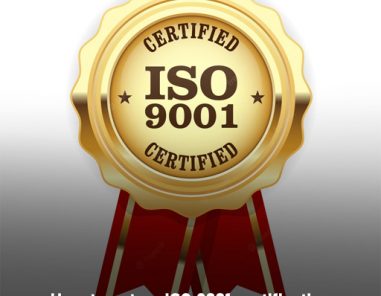
How to get an ISO 9001 certification
The ISO 9001 certification gets your Quality Management System (QMS) recognis...
Read MoreIn the past several years, businesses are finding it increasingly difficult to differentiate themselves in the eyes of their customers against their countless competitors. Becoming ISO certified helps to highlight your commitment to continual improvement, efficient processes and opens you up to business opportunities that create a positive business image in the eyes of the stakeholders and the community. Many organisations utilise ISO certification as a strategy to minimise waste, increase productivity in the workplace and reduce the number of workplace incidents or errors.
Irrespective of the standard, the certification process in Australia contains five stages, namely:
Usually, these stages are initiated after an initial consultation, where an ISO consultant will outline the components involved in the certification process. In this article, we will discuss how to get ISO certified in Australia.

Even before you begin your certification process, you may require an initial consultation to help you choose a certification that is the most appropriate or suitable for your unique needs. There are several ISO certifications available for organisations such as ISO 9001 that focuses on quality management, ISO 14001 that focuses on environmental management, ISO 45001 that enhances occupational safety and ISO 22000 that works on improving food safety management.
You can visit our certification pages on for an up-to-date list of all the available certifications.
During the initial consultation, the ISO consultant in Australia will discuss what your business has previously done in the area of compliance, and identify what you wish to achieve from the certification process. This discussion will help to determine which certification is best suited for your business needs.

The certification process begins by conducting a gap analysis. Whether you choose to work with an ISO consultant or on your own, you must begin by identifying the deficiencies that exist in your system.
The gap analysis comprises of a review of your business against the desired ISO standards. It highlights the areas of your business that are lacking and require improvements to become eligible for the certification. The gap analysis is essentially used as a basis to prepare for compliance documentation. You can find out more about Gap Analysis on the ISO 9001 Consulting in Australia page.
One of the key components of the certification process is preparing ISO documents, as it requires organisations to scrutinise their processes. The documents need to outline compliance objectives and the procedures the business follows, to ensure that they are adhering to the specific recommendations of the ISO standards.
Once the documentation is completed, a JAS-ANZ accredited Conformity Assessment Body (CAB) can review the document as a part of the external certification process. The document will serve as evidence that your management system meets the requirements of the chosen standard as a reference guide for your employees, helping them to work with the newly modified processes. On the ISO 45001 certification and other ISO certification page, we have provided a complete guide to the required documents.
Depending upon your business requirements and the certification that you have chosen, you may choose to create a new management system to ensure long-term compliance. Alternatively, you also have the option of modifying your existing processes, so that they become compliant to the recommendations of your chosen standard. The next stage after developing your compliant management system involves implementing the system into your business and integrating it into your daily operations.

One of the lengthiest parts of the certification process is the implementation stage. In this phase, the ISO requirements become a part of the organisation itself. In order to deal with any organisational resistance, it is beneficial to involve your employees in the implementation phase.
This can be done by providing training on working with the newly modified processes and creating awareness about the benefits the certification will bring at all levels. If you are planning to ISO 14001 implementation or other types of ISO certification in Australia, ISO Council services will help you.
Auditing is an ongoing process that is conducted both internally and externally from the business, to ensure that the processes remain compliant with the ISO certification. During an internal audit, various department heads with sufficient experience audit the processes to ensure that there are no discrepancies between the documentation and the actual practice. Similarly, during an external audit, non-conformances are identified.
The regular practice of auditing initiates continual improvement by identifying new opportunities for more efficient processes, and quickly respond to new changes. The top management needs to provide internal training to ensure that all stakeholders are proficient in the processes and can fulfil objectives identified in the documentation stage.
In order to get your ISO certificate in Australia, you need to conduct a gap analysis to highlight any deficiencies that exist between the recommendations of the chosen standard and your current business practises. During the next stages, get the necessary documents, develop your management system, and implement it, going on to audit it for certification and ongoing improvement.
ISO certification gives your organisation a competitive edge. By helping you increase operational efficiency and overall product consistency, your business credibility and authority will soar to new heights.

Copyright © 2022 The ISO Council | Privacy Policy